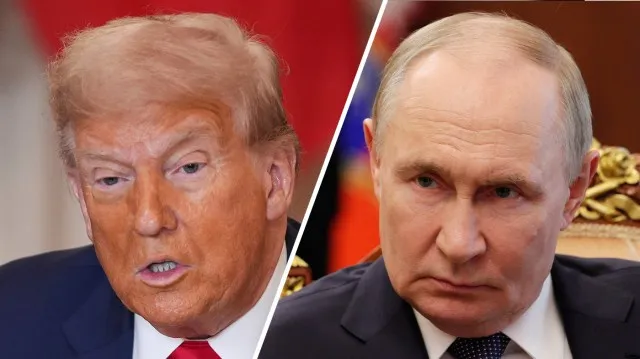Republicans are showing a growing appetite for long-threatened sanctions that would seek to cut off Russia from vital trading partners like China, India and possibly Europe, as President Trump looks for leverage to stop the Ukraine war.
Trump earlier this week sided with Ukraine hawks in Congress when he said the U.S. would continue providing crucial Patriot air-defense missiles and other weapons to Kyiv, apparently overruling a Pentagon directive days earlier pausing those shipments.
The president has also been displaying a mounting frustration with Russian President Vladimir Putin, prompting GOP leaders in Congress to show renewed interest in a sweeping sanctions regime.
"Vladimir Putin has shown an unwillingness to be reasonable and to talk seriously about brokering a peace, and I think we have to send him a message -- that's my view," Speaker Mike Johnson (R-La.) told reporters Wednesday when asked about a sanctions bill.
Trump has avoided staking out a firm position on the proposal, but he has repeatedly said he's considering it. The latest version would empower Trump to impose a 500 percent tariff on imports from any nation that purchases Russian uranium, gas and oil.
Putin's war aims haven't budged in more than three years of fighting, despite mounting sanctions and massive battlefield losses.
Hein Goemans, a political science professor and director of the Peter D. Watson Center for Conflict and Cooperation at the University of Rochester, said a ramped-up sanctions regime -- if it successfully cuts off Russia from the global financial system -- could finally force Putin to downsize his demands for a ceasefire.
"If they close off Russia from the financial network of the West, that will be the end for Putin," he said.
It's unclear whether Graham's bill would do that. The White House has reportedly requested that the legislation give Trump full control over actually imposing sanctions, meaning the president, not Congress, will likely decide the ultimate scope and scale of the penalties.
Graham has previously proposed a carveout for friendly countries that support Ukraine's fight against Russia, after European allies expressed fears about its impact.
Russia's trade with Europe was down 17 percent last year, reaching a historic low, but it still exported $68.4 billion in goods to Europe, compared to $329.2 billion to Asia -- figures largely comprised of oil, natural gas and fertilizer sales.
"If this passes," Goemans said, Trump "might be very eager to use it, and it might have an effect on third countries."
Its actual impact, he said, would depend on its success in isolating Russia, whose central banker, Elvira Nabiullina, has proven a "genius" at keeping its economy humming despite the war and resulting sanctions.
Trump has expressed growing frustration with Putin in recent weeks and on Tuesday suggested Russia’s leader couldn’t be trusted.
“We get a lot of bulls‑‑‑ thrown at us by Putin, if you want to know the truth. He’s very nice all the time, but it turns out to be meaningless,” Trump said at a Cabinet meeting.
Trump said Thursday that a new deal would allow NATO to send U.S. weapons to Ukraine, with the military alliance bearing the brunt of the cost.
Majda Ruge, a senior policy fellow with the United States program at the European Council on Foreign Relations, said despite the latest developments, she was not expecting a significant change in Trump administration policy.
“While the signals in the recent days suggest that Trump may want to use an increase in weapons deliveries to Ukraine to put pressure on the Russians in the negotiations, previous patterns of Trump’s behaviour revealed consistent lack of willingness to put pressure on Putin,” she said.
“The question is -- whether the recent change of tone means that he is breaking that pattern. My guess would be -- unlikely, but I am happy to be proven wrong.”
Trump has long touted his relationship with Putin, promising throughout his campaign to end the Ukraine war within 24 hours of returning to office.
While that timeline has proven wildly optimistic, the contours of a deal have started taking shape. Ukraine has softened some of its red lines around leaving territory under Russian control, as well as immediate NATO membership, though it still wants a U.S.-backed security guarantee.
Goemans said one of his graduate students surveyed Russian public opinion and found growing support there for ending the war along boundaries drawn around the four regions Moscow illegally annexed in September 2022. And he sees signs that Putin is designing Russia's offenses to expand control in those areas, suggesting a potential endgame.
Still, Putin has not stepped back from his maximalist demands to remove the "Nazi" regime in Ukraine, restrict Ukraine's military and bar Western security partnerships.
And while Republican winds seem to be blowing against Putin, both the president and his party have repeatedly waffled on support for Ukraine.
Just last week, Defense Secretary Pete Hegseth signed off on a pause on crucial air defense weapons pending a review of U.S. stockpiles. Trump has suggested he was unaware of the decision, but it irked Senate Republicans, who were quick to pounce when Trump reversed the move.
Sen. Mitch McConnell (R-Ky.) released a statement blasting "restrainers" in the Pentagon; one senior Senate Republican aide called the U-turn "a clear goof-up on a lot of levels"; and Sen. Thom Tillis (R-N.C.) said the incident showed Hegseth is "out of his depth as a manager of a large, complex organization."
Others in the GOP criticized the resumption of weapons shipments.
"When are we going to stop sending military aid to Ukraine?" Sen. Rand Paul (R-Ky.) said Wednesday in a post on social platform X. "This is a conflict we have no business being involved in."
"The United States has already shelled out tens of billions of dollars to Zelenskyy," Rep. Eric Burlison (R-Mo.) added, referring to Ukrainian President Volodymyr Zelensky. "The American people have been very clear: no more money to Ukraine."
